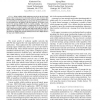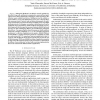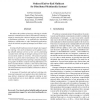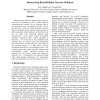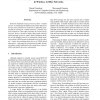INFOCOM
2000
IEEE
14 years 3 months ago
2000
IEEE
Estimating the network delays between each pair of nodes in a multicast session is the key parameter in reliable multicast; it is used, among other things, in suppressing the impl...
INFOCOM
2000
IEEE
14 years 3 months ago
2000
IEEE
—Many scalable reliable multicast protocols use the local repair scheme where certain receivers retransmit packets by other receivers. Such schemes need a mechanism, called messa...
INFOCOM
2000
IEEE
14 years 3 months ago
2000
IEEE
—Although IP Multicast is an effective network primitive for best-effort, large-scale, multi-point communication, many multicast applications such as shared whiteboards, multi-pl...
ICC
2000
IEEE
14 years 3 months ago
2000
IEEE
We present a new reliable multicast protocol, called ARM for Adaptive Reliable Multicast. Our protocol integrates ARQ and FEC techniques. The objectives of ARM are (1) reduce the ...
HICSS
2000
IEEE
14 years 3 months ago
2000
IEEE
We address the problem of message ordering for reliable multicast communication. End-to-end multicast ordering is useful for ensuring the collective integrity and consistency of d...
ICPP
2003
IEEE
14 years 4 months ago
2003
IEEE
Any reliable multicast protocol requires some recovery mechanism. A generic description of a recovery mechanism consists of a prioritized list of recovery servers/receivers (clien...
CNSR
2005
IEEE
14 years 5 months ago
2005
IEEE
Although many multicast communication protocols have been recommended at IETF, reliable multicast communications currently rely on programs built at the application layer, e.g., m...
CCGRID
2005
IEEE
14 years 5 months ago
2005
IEEE
Grid computing can be characterized as a distributed infrastructure that is a collection of computing resources within or across locations that are aggregated to act as a unified ...
WOWMOM
2006
ACM
14 years 5 months ago
2006
ACM
RTS-CTS handshake based protocols achieve “reliable unicast” by eliminating the hidden node problem effectively, however, these solutions are not directly or efficiently gene...

